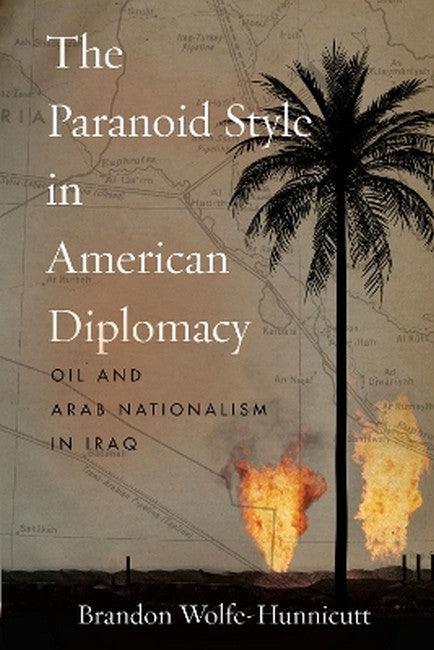Brandon Wolfe-Hunnicutt is Associate Professor of History at California State University, Stanislaus. His writing has appeared in Diplomatic History, Diplomacy & Statecraft, and the Oxford Research Encyclopedia of American History.
Request Academic Copy
Please copy the ISBN for submitting review copy form
Description
1. The Rise and Fall of the Hashemite Monarchy 2. The Free Officers' Revolution 3. The Emergence of OPEC 4. The Overthrow of Qasim 5. The Rise and Fall of the Ba'th 6. The Emergence of the Iraq National Oil Company 7. The Arab-Israeli June War 8. The Return of the Ba'th 9. The Nationalization of the IPC
"In 2003, the U.S. invaded Iraq on the basis of lies. Brandon Wolfe-Hunnicutt's The Paranoid Style in American Diplomacy is a gripping backstory that reveals the historical truths of U.S.-Iraqi relations. American cold warriors inherited Britain's imperial role but failed to stop Iraqis from pursuing natural resource sovereignty."-Nathan J. Citino, Rice University, author of Envisioning the Arab Future "Brandon Wolfe-Hunnicutt's riveting account of US policy in 1960s Iraq, the rise of Saddam Hussein, and the end of the West's oil monopoly reads like a John Le Carre novel with footnotes, where the moral compromises and paranoia of the Cold War drive the action."-Robert Vitalis, University of Pennsylvania, author of Oilcraft "Brandon Wolfe-Hunnicutt illuminates the stories of visionary, radical Iraqi politicians who sought control over their country's oil and tested the limits of American power. The Paranoid Style in American Diplomacy provokes readers to rethink what they think they know about Iraq's encounters with US imperialism."-Arbella Bet-Shlimon, University of Washington, author of City of Black Gold "Wolfe-Hunnicutt has crafted an engaging account that makes a substantive contribution to the evolving history of the global oil order. It stands as an impressive work on U.S.-Iraqi relations, a factor in international relations that is crucial to the broader history of the twentieth century and the evolution of American empire. And it provides a provocative thesis, suggesting a Cold War landscape in which paranoia drove policy, added to the upheavals that influenced the postwar petroleum order, and set the stage for the oil revolution of the 1970s and the transformation of the global political economy."-Gregory Brew, Passport "Producing a book that successfully knits three disparate strands of a story together is no mean feat. Yet that is exactly what Wolfe-Hunnicutt has done. This is a book well worth the time invested in reading it. It definitely deserves a very wide readership."-Mary Ann Heiss, Passport "Wolfe-Hunnicutt has written an important study that contributes greatly to our understanding of U.S.-Iraqi relations in a transitional era and illuminates the dynamics of natural resource nationalism and the consolidation of transnational oil elites in the post-imperial and Cold War years. It will certainly be on my graduate students' reading lists!"-W. Taylor Fain, Passport "Wolfe-Hunnicutt has produced an ambitious, wide-ranging, nuanced, yet hard-hitting critique of the U.S. approach to Arab and Iraqi nationalism; of the international oil industry; and of the authoritarian tendencies within Iraqi politics that, alas, surged to the fore during this three-cornered diplomatic encounter."-Salim Yaqub, Passport "The Paranoid Style in American Diplomacy is an important work within the growing body of scholarship that provides equal attention to both sides of the relationship between the Arab world and the United States. The book will be required reading for those who seek to understand the history of Iraqi-US relations, as well as be of interest more broadly to those studying the political economy of oil, US empire, and decolonization."-David Wight, H-Diplo "Drawing information from primary sources including the IPC archives, US State Department records, and recollections of the Iraqi government officials central to the politics of the era, Wolfe-Hunnicutt weaves an engaging narrative as convincing as it is well researched."-Philippe Atallah, H-War "In this crisply written, nuanced, and unusual book, historian Brandon Wolfe-Hunnicutt reframes relations between the United States and Iraq primarily from 1960 to 1980 and offers a multifaceted account by combining histories that typically are not brought into conversation with each other... Indeed, the biggest contribution of this book is that it does not offer up a classic either/or story, i.e., either a US foreign policy narrative or an Iraqi political or cultural history, but rather deftly merges together various threads that often are treated as disparate. This is what makes this book novel and exciting."-Magnus T. Bernhardsson, The Middle East Journal "The Paranoid Style in American Diplomacyis an essential contribution that dismantles much of the received wisdom about the politics of oil and the global struggle for equitable development. Moreover, it invites further research that critically investigates the subsequent history of international interventions in Iraq and their intersections with private capital and state authoritarianism. The book deserves to be read by all students of US-Arab relations, oil, Iraq, Middle East politics and state formation, covert operations, and the history of capitalism."-Nathaniel George, H-Diplo "In his brilliant account of the intersection of US foreign policy, Arab nationalism, and oil interests,The Paranoid Style of American Diplomacycarefully walks its readers through the challenges the US faced when navigating its relations with Iraq from the creation of the Iraq Petroleum Company (IPC) in the 1920s, through the tumult of Iraq's revolution in 1958, and ending with the nationalization of the IPC in the early 1970s."-Bryan R. Gibson, H-Diplo "While one can debate whether the victory was worth the cost, this excellent study leaves little doubt that US policies and actions and the structure and power of the oil industry played an important role in the outcome."-David S. Painter, H-Diplo "In the introduction, Brandon Wolfe-Hunnicutt somewhat humbly describes his book as a history of the Iraq Petroleum Company (IPC). The book is that, and much more."-Sara Pursley, H-Diplo

